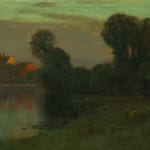

Charles Warren Eaton
Sunrise in New England, n.d.
Oil on canvas
28 x 30 in (71.1 x 76.2 cm);
framed 35 x 37 in (88.9 x 94 cm)
framed 35 x 37 in (88.9 x 94 cm)
Charles Warren Eaton (1857, Albany, NY – 1937, Bloomfield, NJ) was an American landscape painter who helped shape the Tonalist movement, in which artists rendered their natural environments in deep...
Charles Warren Eaton (1857, Albany, NY – 1937, Bloomfield, NJ) was an American landscape painter who helped shape the Tonalist movement, in which artists rendered their natural environments in deep hues and hazy shadows to evoke a moody ambiance. Eaton often excluded human and animal figures from his scenes, instead focusing on rendering the luminous quality of light and details in trees, which earned him the moniker ‘the pine tree painter.’ He spent decades painting the white pine forests near his summer home in Connecticut in oil paintings, watercolors, monotypes, and pastels. He was a founding member of the American Watercolor Society. Oscar Wilde was a collector of Eaton's paintings, and his works are in the permanent collections of the Brooklyn Museum, NY; Smithsonian American Art Museum, Washington, DC; National Gallery of Art, Washington, DC; Dallas Museum of Art, TX; Montclair Art Museum, NJ; and Birmingham Museum of Art, AL, among others.

